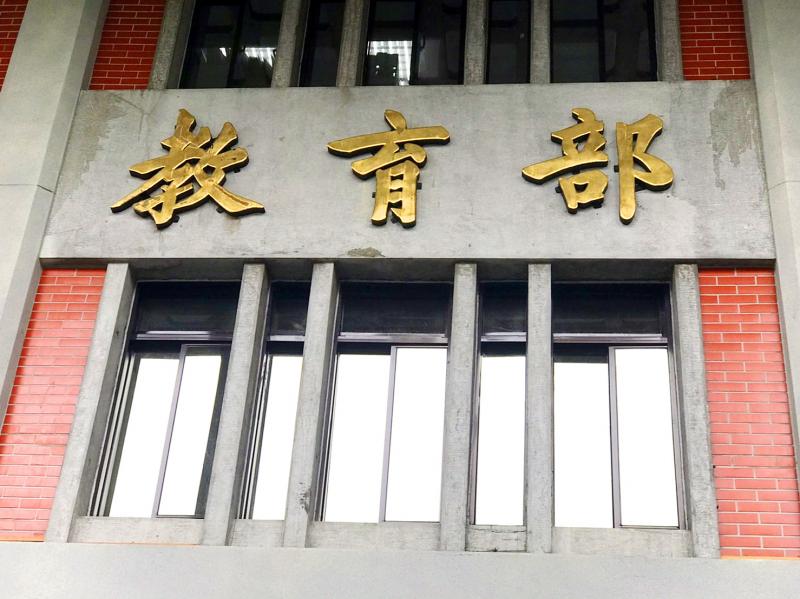The Ministry of Education (MOE) should investigate politicians whose education credentials have come under scrutiny to uphold the integrity of academia, Changhua County Councilor Huang Sheng-lu (黃盛祿) said on Thursday.
Huang’s comments followed allegations that Kaohsiung mayoral by-election candidate Jane Lee (李眉蓁) of the Chinese Nationalist Party (KMT) had plagiarized 96 percent of her master’s thesis.
Academia and politicians serve each other, as politicians need higher education to win greater support, while universities reap political and economic benefits from having alumni in politics, Huang said.

Photo: Rachel Lin, Taipei Times
Huang cited former KMT legislator Yu Yueh-hsia (游月霞) as an example, saying that she only had a vocational high school degree prior to serving as a lawmaker, and after her election, she earned a master’s degree in administrative management from National Changhua Normal University.
Union of Private School Educators president Yu Jung-hui (尤榮輝) said that Taiwan’s higher education system is showing signs of commercialization, especially in master’s degree courses offered to working people.
He said that the intent of the program — allowing people to pursue a degree while working — was good, but such programs run the risk of rubber-stamping academic degrees.
Universities are pandering to part-time students, lowering standards so they can more easily complete studies and obtain degrees, he said.
Working people have less time for studies or to write a thesis in addition to their full-time jobs, leading to the appearance of “essay mills,” where students turn in theses on topics that are incompatible with their subject of study or resorting to outright plagiarism, Yu Jung-hui said.
Schools need students and the students — who are often politicians, government officials and business executives — need the degree to “gold-plate” their credentials, he said.
Professors are prone to employ lax grading standards for these types of students, as politicians could expand their social network or provide economic benefits for their school or department, he said.
Yu Jung-hui said that these programs must institute tougher standards to prevent universities from helping to create fraudulent academic credentials and being seen as degree peddlers.
He added that the public and the ministry should address the deterioration of morals in higher education.
Over the past five years, there have been 17 incidents in which educational degrees have been revoked due to thesis plagiarism, the ministry said.
The university and professors should take responsibility for the issue, the ministry said, adding that how a university prevents incidents would be important when the ministry reviews universities’ applications for new colleges, student recruitment programs or government subsidies.
The ministry said that in the most extreme cases, it could refuse departments that have failed to institute measures to prevent plagiarism from applying for subsidies.
The ministry said that it is considering establishing a digital comparison system that would use the National Central Library’s archived theses database as a source, adding that the system could assist universities in identifying plagiarism.

The Ministry of Economic Affairs has fined Taobao NT$1.2 million (US$36,912) for advertisements that exceed its approved business scope, requiring the Chinese e-commerce platform to make corrections in the first half of this year or its license may be revoked. Lawmakers have called for stricter enforcement of Chinese e-commerce platforms and measures to prevent China from laundering its goods through Taiwan in response to US President Donald Trump’s heavy tariffs on China. The Legislative Yuan’s Finance Committee met today to discuss policies to prevent China from dumping goods in Taiwan, inviting government agencies to report. Democratic Progressive Party Legislator Kuo Kuo-wen (郭國文) said

The Ministry of Economic Affairs has fined Taobao NT$1.2 million (US$36,900) for advertisements that exceeded its approved business scope and ordered the Chinese e-commerce platform to make corrections in the first half of this year or its license would be revoked. Lawmakers have called for stricter supervision of Chinese e-commerce platforms and more stringent measures to prevent China from laundering its goods through Taiwan as US President Donald Trump’s administration cracks down on origin laundering. The legislature’s Finance Committee yesterday met to discuss policies to prevent China from dumping goods in Taiwan, inviting government agencies to report on the matter. Democratic Progressive Party

Taiwan and its Pacific ally Tuvalu on Tuesday signed two accords aimed at facilitating bilateral cooperation on labor affairs, according to Taiwan’s Ministry of Foreign Affairs (MOFA). The governments inked two agreements in Taipei, witnessed by Foreign Minister Lin Chia-lung (林佳龍) and visiting Deputy Tuvaluan Prime Minister Panapasi Nelesone, MOFA said in a news release. According to MOFA, the agreements will facilitate cooperation on labor issues and allow the two sides to mutually recognize seafarers’ certificates and related training. Taiwan would also continue to collaborate with Tuvalu across various fields to promote economic prosperity as well as the well-being of their

Sung Chien-liang (宋建樑), who led efforts to recall Democratic Progressive Party (DPP) Legislator Lee Kun-cheng (李坤城), was released on bail of NT$80,000 today amid outcry over his decision to wear a Nazi armband to questioning the night before. Sung arrived at the New Taipei District Prosecutors’ Office for questioning in a recall petition forgery case last night wearing a red armband bearing a swastika, carrying a copy of Adolf Hitler’s Mein Kampf and giving a Nazi salute. Sung left the building at 1:15am without the armband and covering the book with his coat. Lee said today that this is a serious